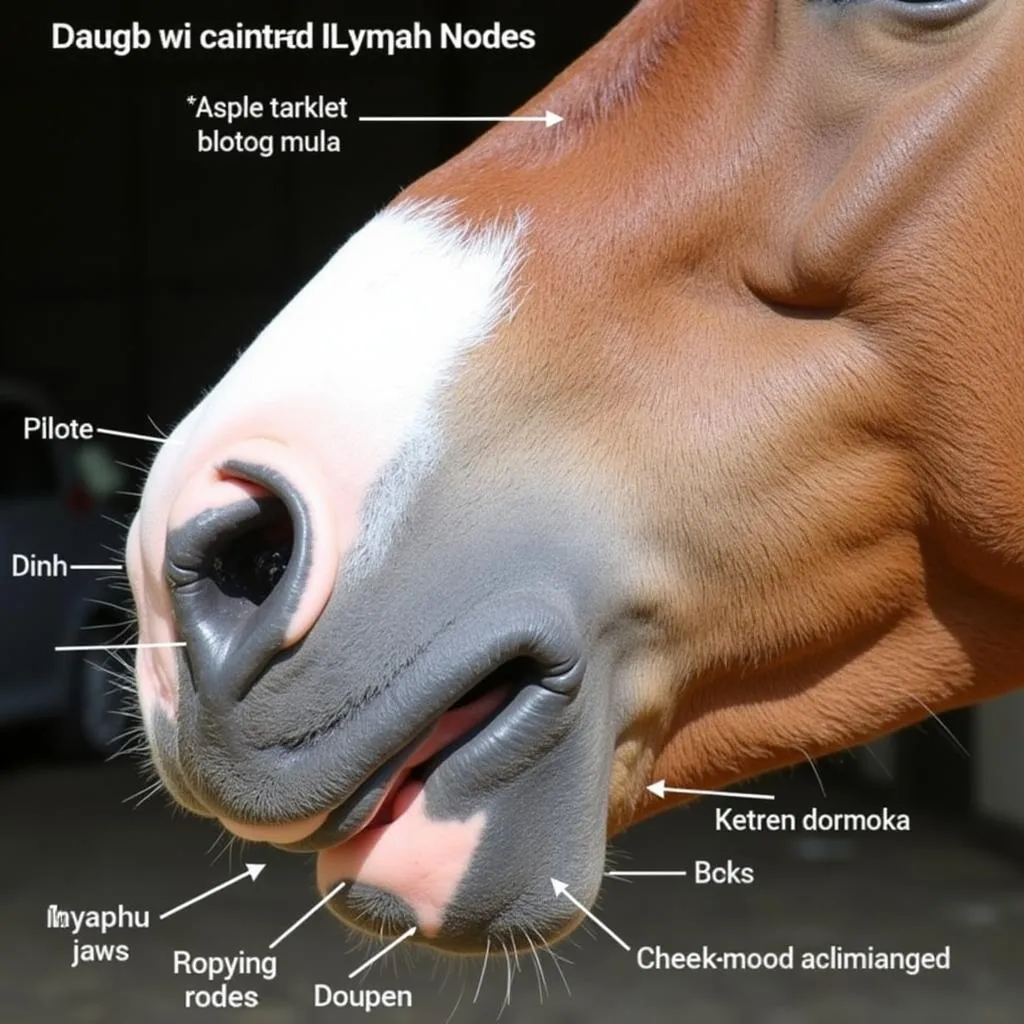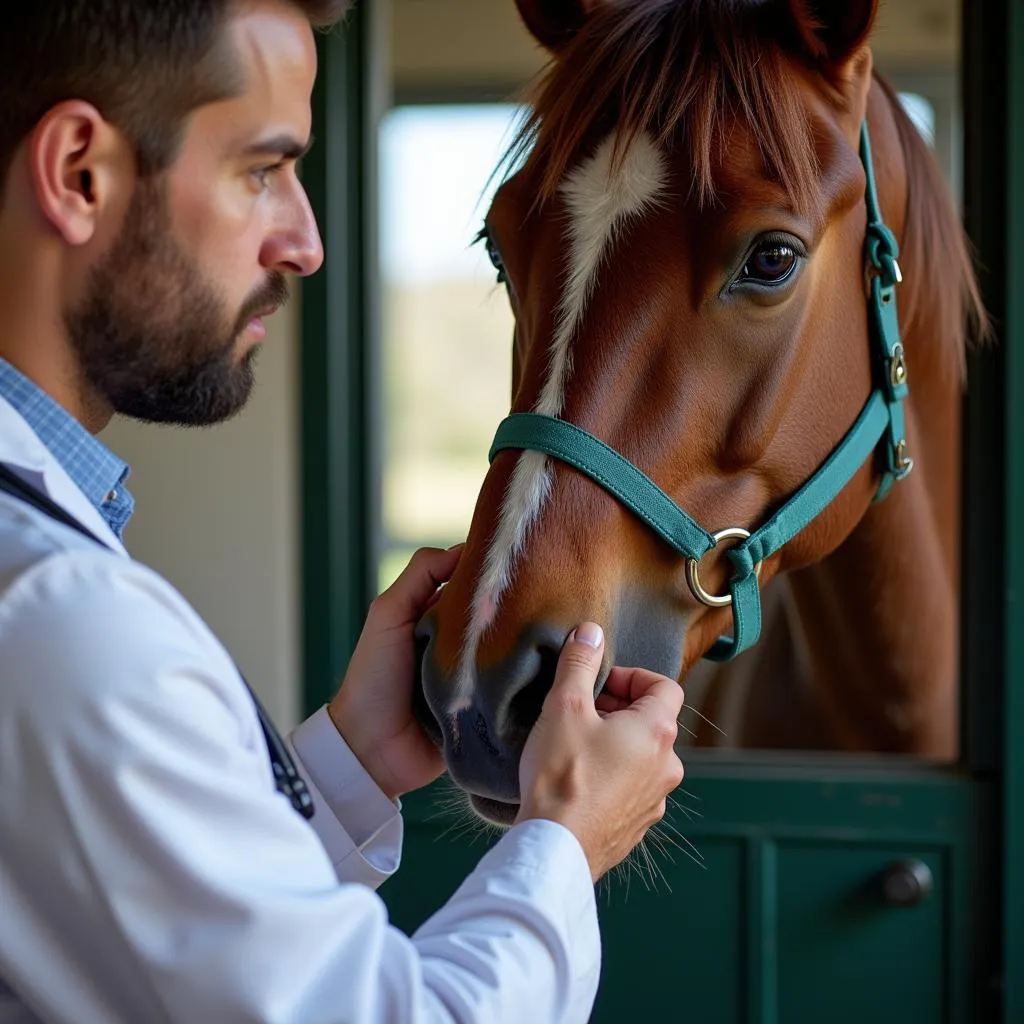Finding a lump under your horse’s jaw can be concerning. While many causes are benign, some require veterinary attention. This comprehensive guide will explore common reasons for lumps under a horse’s jaw, associated symptoms, and available treatment options.
Understanding Lumps in Horses
Lumps, also known as masses, can occur anywhere on a horse’s body, including under the jaw. These lumps can vary in size, shape, and texture, ranging from small and soft to large and firm. They may be painless or cause discomfort, depending on the underlying cause.
Common Causes of Horse Lump Under Jaw
 Horse Lymph Nodes Under Jaw
Horse Lymph Nodes Under Jaw
1. Swollen Lymph Nodes: Lymph nodes are small, bean-shaped glands that play a crucial role in the horse’s immune system. Located throughout the body, including under the jaw, lymph nodes filter lymph fluid, trapping and destroying harmful substances. When a horse’s immune system fights infection or inflammation, nearby lymph nodes may enlarge, resulting in a lump under the jaw.
 Strangles in Horses
Strangles in Horses
2. Strangles: This highly contagious bacterial infection primarily affects young horses. Caused by Streptococcus equi, strangles often leads to abscesses in the lymph nodes under the jaw and throatlatch area. These abscesses can cause significant swelling, making it difficult for the horse to swallow or breathe.
3. Tooth Root Abscess: An abscess at the root of a tooth can also cause a lump under a horse’s jaw. This typically occurs due to dental disease, trauma, or infection.
4. Trauma or Injury: A kick, bump, or other injury to the jaw can cause swelling, leading to a lump.
5. Benign Growths: Some lumps under the jaw are non-cancerous growths, such as lipomas (fatty tumors) or cysts. These growths are typically slow-growing and painless.
6. Cancerous Growths: While less common, cancerous tumors can develop under a horse’s jaw. These growths may be firm, fixed, and grow rapidly.
When to Worry About a Horse Lump Under Jaw
It’s essential to contact your veterinarian immediately if you notice any of the following:
- Rapid growth of the lump
- Pain or discomfort when the lump is touched
- Difficulty swallowing or breathing
- Nasal discharge
- Loss of appetite
- Fever
- Lethargy
Diagnosing the Cause of the Lump
To determine the cause of the lump, your veterinarian will perform a thorough physical examination and gather a detailed history of your horse’s health. Diagnostic tests may include:
- Palpation: Feeling the lump to assess its size, shape, texture, and mobility.
- Needle Aspiration: Using a fine needle to collect cells or fluid from the lump for microscopic examination.
- Biopsy: Surgically removing a small tissue sample from the lump for laboratory analysis.
- Blood tests: Evaluating the horse’s overall health and checking for signs of infection or inflammation.
- Ultrasound: Using sound waves to create images of the lump and surrounding tissues.
- X-rays: Examining the bones and teeth in the jaw area.
Treatment Options for Horse Lump Under Jaw
Treatment for a lump under the jaw depends on the underlying cause.
-
Swollen Lymph Nodes: If the lump is due to a mild infection, your veterinarian may recommend supportive care, such as warm compresses and rest. Antibiotics may be necessary for bacterial infections.
-
Strangles: Treatment typically involves isolating the infected horse, draining abscesses, and administering antibiotics.
-
Tooth Root Abscess: Treatment usually requires extracting the affected tooth and draining the abscess.
-
Trauma or Injury: Cold therapy, anti-inflammatory medications, and rest are typically recommended for trauma-related lumps.
-
Benign Growths: Monitoring the growth and surgical removal may be options, depending on the size and location of the lump.
-
Cancerous Growths: Treatment for cancerous growths varies depending on the type and stage of cancer. Options may include surgery, chemotherapy, or radiation therapy.
“Early detection and diagnosis are crucial for successful treatment of any health issue in horses. Regular veterinary check-ups and prompt attention to any unusual signs are essential for maintaining your horse’s well-being.” – Dr. Emily Carter, DVM
Preventing Horse Lump Under Jaw
While not all causes of lumps under the jaw are preventable, you can reduce the risk by:
- Maintaining a regular vaccination schedule, including the strangles vaccine.
- Providing proper dental care, including regular dental exams and floatings.
- Protecting your horse from injury by ensuring a safe environment.
- Monitoring your horse’s health closely and contacting your veterinarian promptly if you notice any unusual lumps or bumps.
Conclusion
Finding a lump under your horse’s jaw can be alarming, but remember that many causes are treatable. By understanding the potential causes, symptoms, and treatment options, you can be prepared to act quickly and seek appropriate veterinary care for your equine companion. Early detection and intervention offer the best chance for a positive outcome.
If you discover a lump under your horse’s jaw, contact our experienced equine veterinarians at Justus Horses USA immediately. We’re here to help you navigate your horse’s health concerns with compassion and expertise. Call us at 0772127271, email us at [email protected], or visit our clinic at QGM2+WX2, Vị Trung, Vị Thuỷ, Hậu Giang, Việt Nam. We offer 24/7 support for your peace of mind.